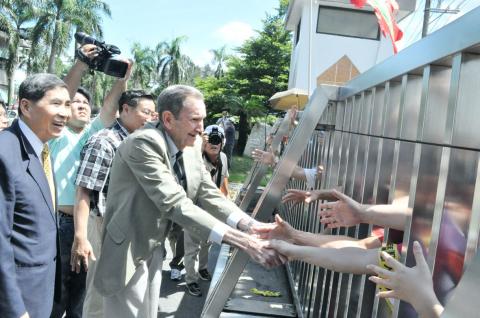Former US attorney-general Ramsey Clark, a longtime advocate for Taiwanese democracy, yesterday visited former president Chen Shui-bian (陳水扁) in Taipei Prison and said that the government should release Chen immediately.
Clark visited Chen in the afternoon, accompanied by former Democratic Progressive Party (DPP) legislator Chai Trong-rong (蔡同榮) and Chen’s son, Chen Chih-chung (陳致中).
After the 80-minute visit, Clark left the prison and told hundreds of Chen Shui-bian supporters that the former president’s health was deteriorating and that he needed be freed immediately.

Photo: Yu Juei-jen, Taipei Times
Taiwanese should stand up to support the release of Chen Shui-bian, he said.
Clark said Chen Shui-bian should receive appropriate medical treatment, as well as his human rights. All people in Taiwan should call for Chen Shui-bian’s release and only people power could make it happen, he said.
Hundreds of supporters cheered Clark’s remarks.
Clark also told reporters that the former president was clearly suffering and very ill.
“I respect his courage. He has a strong will. He is upheld by people’s support and I believe he will regain his strength after he is released,” Clark said.
He said Chen Shui-bian’s release would be good for Taiwanese and for all political parties.
He added that a report on Chen Shui-bian’s situation would be submitted to concerned US governmental departments and said he hoped President Ma Ying-jeou (馬英九) would consider freeing the former leader.
Chen Shui-bian is serving a 17-and-a-half-year prison term on corruption charges. During his incarceration, he has complained about several physical ailments, including chest pains.
An internationally renowned defender of human rights, Clark flew to Taiwan in 1980 to express concerns over what came to be known as the Formosa Incident, also known as the Kaohsiung Incident, during which riot police cracked down on protesters calling for political rights.

INVESTIGATION: The case is the latest instance of a DPP figure being implicated in an espionage network accused of allegedly leaking information to Chinese intelligence Democratic Progressive Party (DPP) member Ho Jen-chieh (何仁傑) was detained and held incommunicado yesterday on suspicion of spying for China during his tenure as assistant to then-minister of foreign affairs Joseph Wu (吳釗燮). The Taipei District Prosecutors’ Office said Ho was implicated during its investigation into alleged spying activities by former Presidential Office consultant Wu Shang-yu (吳尚雨). Prosecutors said there is reason to believe Ho breached the National Security Act (國家安全法) by leaking classified Ministry of Foreign Affairs information to Chinese intelligence. Following interrogation, prosecutors petitioned the Taipei District Court to detain Ho, citing concerns over potential collusion or tampering of evidence. The

Seventy percent of middle and elementary schools now conduct English classes entirely in English, the Ministry of Education said, as it encourages schools nationwide to adopt this practice Minister of Education (MOE) Cheng Ying-yao (鄭英耀) is scheduled to present a report on the government’s bilingual education policy to the Legislative Yuan’s Education and Culture Committee today. The report would outline strategies aimed at expanding access to education, reducing regional disparities and improving talent cultivation. Implementation of bilingual education policies has varied across local governments, occasionally drawing public criticism. For example, some schools have required teachers of non-English subjects to pass English proficiency

NEGOTIATIONS: The US response to the countermeasures and plans Taiwan presented has been positive, including boosting procurement and investment, the president said Taiwan is included in the first group for trade negotiations with the US, President William Lai (賴清德) said yesterday, as he seeks to shield Taiwanese exporters from a 32 percent tariff. In Washington, US Trade Representative Jamieson Greer said in an interview on Fox News on Thursday that he would speak to his Taiwanese and Israeli counterparts yesterday about tariffs after holding a long discussion with the Vietnamese earlier. US President Donald Trump on Wednesday postponed punishing levies on multiple trade partners, including Taiwan, for three months after trillions of US dollars were wiped off global markets. He has maintained a 10 percent

TRADE: The premier pledged safeguards on ‘Made in Taiwan’ labeling, anti-dumping measures and stricter export controls to strengthen its position in trade talks Products labeled “made in Taiwan” must be genuinely made in Taiwan, Premier Cho Jung-tai (卓榮泰) said yesterday, vowing to enforce strict safeguards against “origin laundering” and initiate anti-dumping investigations to prevent China dumping its products in Taiwan. Cho made the remarks in a discussion session with representatives from industries in Kaohsiung. In response to the US government’s recent announcement of “reciprocal” tariffs on its trading partners, President William Lai (賴清德) and Cho last week began a series of consultations with industry leaders nationwide to gather feedback and address concerns. Taiwanese and US officials held a videoconference on Friday evening to discuss the